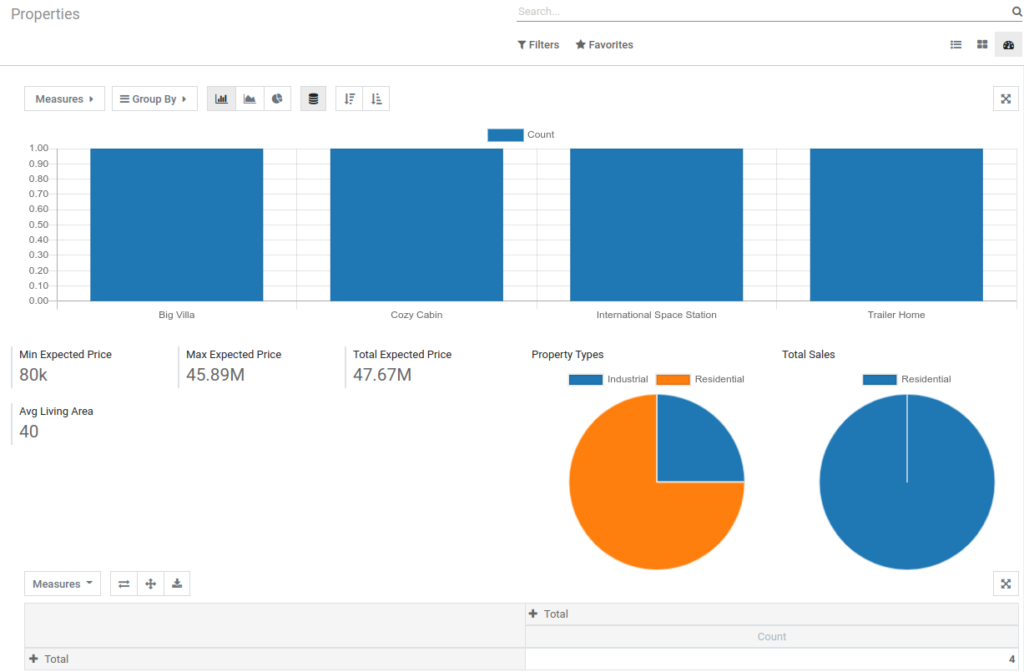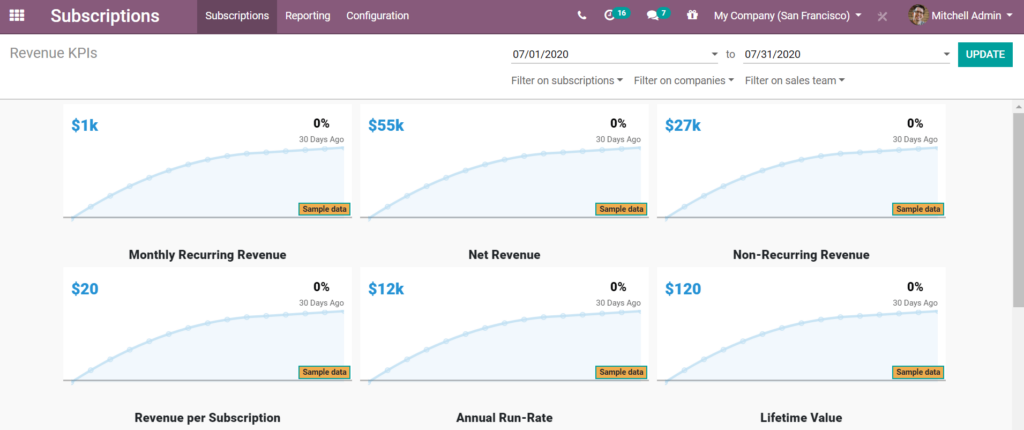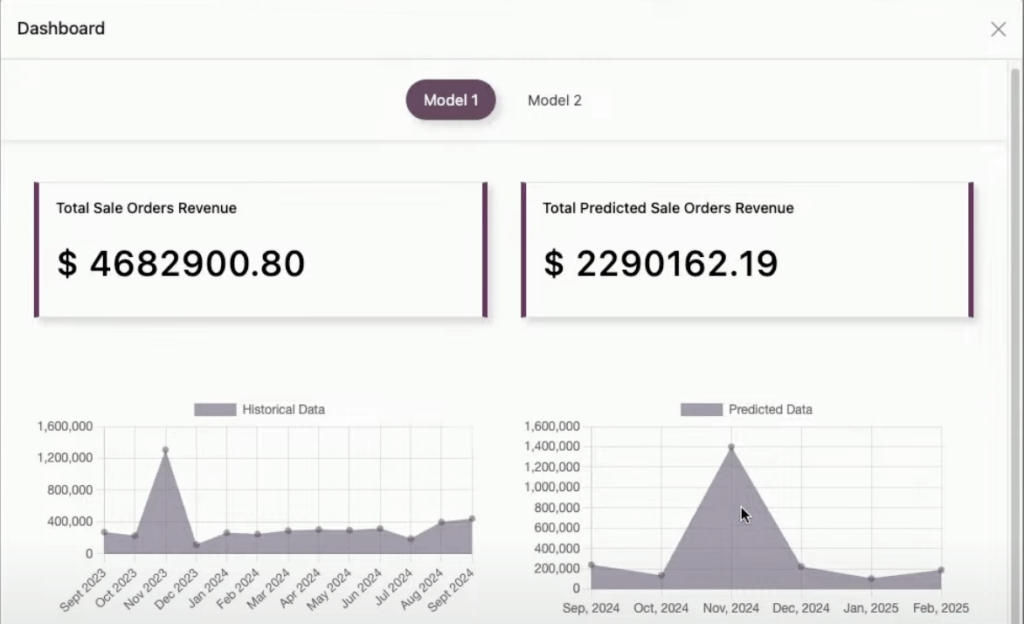Modern businesses face challenges and complexities on a daily basis, and in order to stay competitive, they must be able to make the right decisions. Their quality determines not only the success of an individual project but also the future of the company, so their importance should not be underestimated. In today’s business world, the concept of “data-driven decisions” is constantly on the lips of every management professional. Many business people consider such decisions to be the future of business, because they are based on facts and therefore guarantee accuracy and confidence. Reasons for the popularity of data-driven decisions are that they reduce error and failure probabilities, help to maintain focus on important tasks, and, consequently, increase efficiency, as well as help to predict what trends will be popular in the future and prepare for them in advance.
Efficient data analysis is a prerequisite for good decision-making. Odoo Enterprise Resource Planning (ERP) is a comprehensive system with powerful analytics tools, and many businesses use it successfully. The ERP system collects and centralizes data from all departments and consolidates all the information in a single place. Thus, companies can easily access and analyze the data to identify trends and make better decisions. In this article, we will demonstrate how Odoo analytics empowers businesses to make informed decisions and share detailed information on how this works in practice.
The Role of Analytics in Business Growth
Data analytics is an integral part of modern business, since it helps companies to better understand customers and their preferences, optimize many processes, and make strategic decisions. Companies are constantly faced with huge amounts of data from a variety of sources, and it is crucial to analyze it all correctly to get the most out of it. The main benefits of data analytics include:
- process optimization
- strategic and tactical decision-making
- understanding customers, their wants, and their needs
- predicting future trends and changes in the market
Making decisions without data-driven insights threatens many problems for companies, and below, we will cover the most common ones.
Making unreasonable decisions. Without analyzing data, companies cannot identify trends and patterns. As a result, their decisions are based on guesswork, making it difficult for companies to adapt to changing conditions, and they might fail in today’s competitive business environment.
Difficulties in understanding customers. Without data analytics, it is extremely difficult for companies to understand customer behavior and needs, and consequently, to provide quality services. In addition, without data analytics, companies cannot understand which marketing campaigns are working, because it is impossible to track conversions and the ROI.
The difficulty of increasing sales and revenue. Companies cannot identify buying patterns and understand what motivates their customers. Without this information, marketing strategies and product development cannot be changed, making it extremely difficult to increase revenue.
Odoo analytics tools are a great assistant, with which a business of any size and purpose will be able to overcome informational deficits and many other related problems in order to reach a new level of profit. For example, this system provides analytics on sales data. Companies can analyze sales performance based on revenue or number of items sold, or even view data on a manager-by-manager basis.
Read on, and you will learn more about Odoo ERP analytics and its business benefits.
Key Analytical Features in Odoo
To begin with, it is essential to understand that in Odoo, data is collected through transactions, leads, sales orders, bank statements, invoices, warehouse shipments, and other related methods. Odoo has a flexible data management and analytics system and therefore provides endless possibilities for analyzing existing data and creating reports. This system allows businesses to quickly analyze sales, customers, and supplier data, as well as track costs and manage finances.
Odoo Reporting Tools & Dashboard
Odoo contains some built-in reports, such as Balance Sheet, Trial Balance, Report on Financial Results, Report on Settlements with Counterparties, and others. In fact, Odoo dashboard provides quite a flexible report builder, which helps to realize any report based on accounting data.
Odoo Spreadsheets is a separate module of Odoo ERP that allows companies to work with spreadsheets, such as Google Sheets or Microsoft Excel, without leaving the application. Thus, users can create or edit ready-made tables, calculate formulas, analyze data, make summary tables, and export them in different formats.
The outstanding advantage of Odoo Spreadsheets is that it allows you to build any report without the help of a programmer. In addition, Odoo Spreadsheets is easily integrated with other Odoo modules, which allows you to work with data related to business processes inside tables.

Odoo KPI Tracking
This function allows you to monitor business performance indicators. You can track performance on the following: non-recurring revenue, pure revenue, average revenue per contract, customer lifetime value, annualized revenue, performance on all contracts, and revenue outflow due to customer outflow. All this data helps you to see business situations clearly and understand your strengths and weaknesses. Accordingly, this aspect is extremely important for data-driven decision making.

Predictive Analytics
Odoo ERP provides companies with the ability to predict trends based on historical data. Predictive analytics in Odoo opens up limitless business opportunities; by analyzing data on historical sales patterns, trends, and customer behavior, companies can easily and accurately predict future trends and get ready for them in advance.
In addition, such data analysis can also include customer relationship analytics, which helps to increase the likelihood of product and service purchases. By analyzing information about customers’ preferences and needs, you will be able to recommend the right product that is likely to be added to the cart. In this way, sales become increasingly faster and more efficient, while customer experience is much more positive.

Practical Applications of Odoo Analytics
Odoo analytics tools bring a myriad of benefits to all aspects of a business. They streamline many processes and provide access to properly organized data, which, in turn, can help you to make informed decisions and increase your company’s profits. Below, you can read more about how Odoo analytics in practice helps to improve decision-making processes and drive business growth.
Sales & Marketing Optimization
Sales data is essential information for any company. It helps to better understand customer behavior, market trends, and also to track the effectiveness of sales and marketing strategies with greater understanding about what needs to be improved. With Odoo analytics tools, companies can use data to refine sales strategies and marketing campaigns.
In addition, data analytics helps businesses track progress and measure the effectiveness of their marketing and sales strategies. By comparing current sales data and historical data, companies identify areas that need improvement and are able to make timely adjustments.
Inventory & Supply Chain Management
This component, as a key business area, should be given as much attention as possible. Inventory and supply chain optimization bring many benefits to a business and contribute to its growth and advancement. For example, analyzing supply and demand data improves inventory management and helps companies avoid product shortages or surpluses. In this way, customer experience is improved, and companies reduce storage costs while not incurring losses due to goods being stored for too long.
Additionally, timely data analysis helps to predict the demand for specific products in a particular season and thus optimize production processes.
Using analytical tools is critical for warehouse goods placement. For example, some companies analyze data regarding the volume of products and place larger products closer to the shipping area. This significantly speeds up shipping processes and has a positive impact on overall customer experience. In addition, product placement can also be zoned based on demand data. That is, the higher the demand for a product, the closer it is to the shipping area.
Route optimization also has a significant impact on delivery success. By analyzing traffic data, weather conditions, road conditions, and other related factors, optimized routes can be selected, therefore speeding up delivery times and reducing fuel consumption. Odoo’s analytical tools also allow you to analyze pricing data depending on the delivery service. This allows you to choose a suitable shipping cost.
Financial Analysis & Budgeting
Using data analytics, companies can track their productivity and then identify losses and eliminate them. Based on this data, businesses are able to understand the key drivers and metrics of budget performance and figure out what direction to move in order to improve or optimize their budget.
Odoo Business Intelligence helps companies optimize costs and thus increase profits. Many businesses today use data analytics to automate manual processes, for example, automated business reports. This frees employees from routine tasks, increases efficiency, and leads to cost savings.
Unlock Smarter Business Decisions with Odoo
Implementation Best Practices
Managing and analyzing data is an extremely important aspect of any business. We will give you some valuable tips to help you manage your data well and maximize Odoo’s analytics tools. Odoo analytics tools contribute immensely to effective business development. You will be able to receive real-time business reports—and all data will be automatically added to tables and charts directly from your database—so the information remains up-to-date.
- Regularly check whether all tools are functioning correctly and whether data is synchronized as it should be. With these regular inspections, you will be able to identify possible failures and correct them on time.
- Try to include only the most important metrics. This will help you avoid clutter and identify important data at a glance, which will also save you much time.
- The goals and priorities of any business change from time to time. In order to see current business needs, update the layout regularly.
- Avoid data overload. Using too many widgets, for example, can lead to slower loading times.
- Don’t forget to regularly update your employees’ knowledge. New features and updates are constantly being released. In order to maximize the use of tools, it is important that the team knows how to utilize them correctly.
- Don’t be afraid of new integrations. It is crucial to keep an eye out for new Odoo extensions and integrations, since this way, you will always be up to date with the program’s latest useful features.
Ensuring Data Accuracy
The state of data significantly impacts business performance and growth opportunities. Ensuring data accuracy allows companies to improve the analytical tools they use. Maintaining high data accuracy ensures that all records meet validity criteria and can therefore be used for decision-making. But how to do it right? Let’s figure this out together.
Identify and eliminate duplicate records on a regular basis. Common parameters can be used to identify duplicates. Removing such records helps to create a unified and accurate view of customer data or other information.
Standardize formats. Phone numbers and date formats are the most prominent examples of incompatible formats, making data integration much slower and more difficult. It is important that data is displayed in a consistent format.
Avoid missing some data. Handling missing values is a critical step, because not doing so can lead to skewed analysis results, which will affect data quality.
Use the cross-checking method. This involves comparing data from multiple time periods or sources, so you can identify inconsistencies and eliminate them.
Use predictive analytics. As a vital step in ensuring data accuracy, you can predict potential inaccuracies and address them before they negatively impact performance.
Ensuring data accuracy plays a key role in business success. Accurate data contributes to effective decision making, improved customer engagement, and enhanced productivity. In addition, such a practice also provides a solid foundation for long-term growth, as companies are able to adjust their strategies based on information in real time.
Common Mistakes to Avoid
Data entry mistakes. These are usually human errors. You will want to use automated data collection methods, if possible, or implement data validation rules to prevent such mistakes.
Data integration mistakes. These usually occur when merging data from different systems. To avoid such errors, it is important to follow data handling standards.
Mistakes due to data quality degradation. This is a common mistake that occurs when some data becomes outdated over time. An example would be historical data that has lost relevance and no longer reflects the current situation. In order to avoid such mistakes, you should regularly update data and archive data that is no longer needed.
Conclusion
The goal of any business is, first and foremost, to make a profit. Nevertheless, in order for everything to work properly, you need to be able to make the right decisions, because the efficiency of business processes depends on them. Using data to make decisions is a great way to forecast demand, understand market trends, identify customer needs, and find new business opportunities.
Data-driven decision-making with Odoo involves developing a well-thought-out approach to collect and analyze necessary data while making decisions based on information rather than intuition. Let’s summarize the most popular benefits of data-driven decision-making with Odoo data analysis.
- Improving strategic planning. Companies can set realistic goals, allocate resources effectively, and evaluate the feasibility of any strategy. This ensures that operations are optimized, risks are minimized, and profits are maximized.
- Making more informed decisions. Data-driven business strategies are more successful. Thus, companies attract and retain more customers and have higher levels of profitability. Additionally, financial data management becomes more transparent.
- Improving customer service quality. Accurate data provides valuable information about customer needs, preferences, and behavior. By analyzing this data, companies can provide customized recommendations that lead to improved customer service.
- Cost savings. Data-driven decision-making gives companies the ability to accurately identify the areas for efficiency gains and cost savings. Sales performance tracking and analyzing data on expenses and customer behavior help businesses reduce unnecessary costs.
Odoo ERP, an open-source modular system, provides unique flexibility without sacrificing the quality of work and thus attracts a huge number of users. If you are in search of a feature-rich system that can help automate almost all business processes and offers a huge number of analytics tools, Odoo will be a great option. Learn more about how Odoo analytics tools expand business growth insights and help companies develop, and make sure it is the best choice for you!
Explore Odoo Analytics with VentorTech
Recommended articles:
- How to estimate ERP costs at the beginning of the journey?
- Key Performance Indicators (KPIs) and their Role in Successful ERP Implementation
- Optimizing Inventory Control with Odoo: Understanding Forecasting Methods
- AI Order Processing in Odoo
- How to create a warehouse map and upload it to Odoo
- How to build picking routes in your warehouse for walking minimization
- How a US Repair Company Scaled Up After Migrating from a Legacy System to Odoo
- U.S. automotive company: 15X Growth with Odoo
----------------------------------------------------------------------
Education: Bachelor's degree.
----------------------------------------------------------------------
Experience:
Marketing manager
VentorTech
----------------------------------------------------------------------
Current position: Marketing manager VentorTech
----------------------------------------------------------------------
B2B Marketing
Google Tag Manager and GA






0 Comments